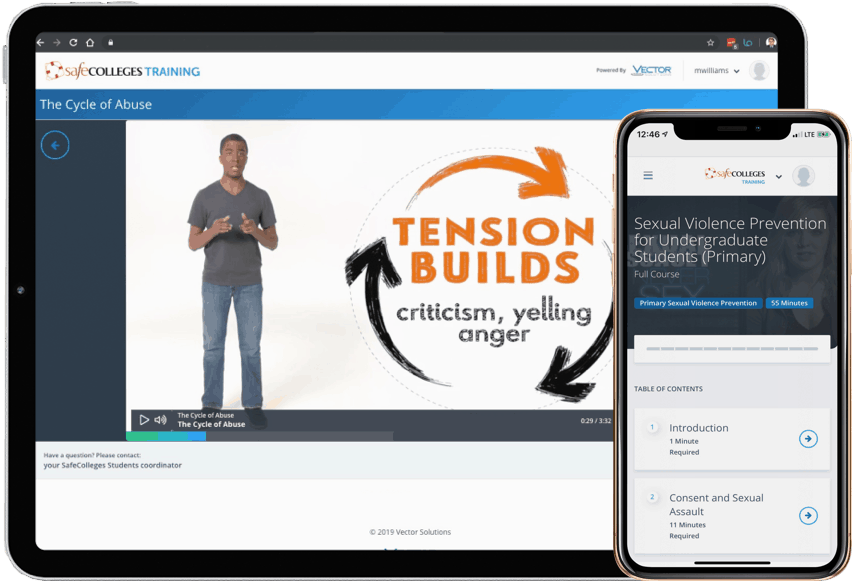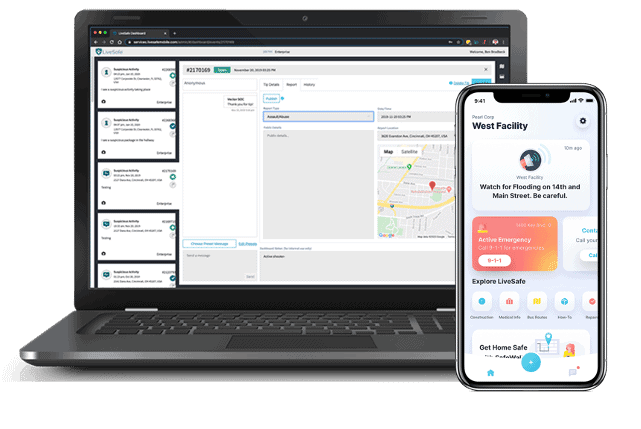About the Campus SaVE Act
In 2013, the Campus SaVE Act amended the Clery Act to increase transparency requirements for higher education institutions, guarantee rights for survivors, form disciplinary standards, and require education prevention programs campus-wide. The Campus SaVE Act is a provision of the Violence Against Women Act (VAWA).
Sexual assault remains a significant problem on college campuses, despite the fact that federal law guarantees all students the right to an education free from sexual harassment and sexual violence.
Is Your Campus Compliant with the Campus SaVE Act?
Your institution must be committed to maintaining a safe work and academic environment free from sexual misconduct of any form. A violation of this commitment is in violation of the Campus Sexual Violence Elimination (SaVE) Act. Such violations are grounds for disciplinary actions, up to and including dismissal from the institution.
How to Comply with the Campus SaVE Act

Greater Transparency
Guaranteed Rights for Victims
Disciplinary Standards
Implementation of Education Prevention Programming
The Campus SaVE Act Terminology
To fully understand the SaVE Act and how to make sure your campus is compliant, it’s important to make sure campus officials are well aware of the terminology used. Institutions for higher education are required to define policies with the following:
Dating Violence - violence by a person who has been in a romantic or intimate relationship with the victim. Whether there was such relationship will be gauged by its length, type, and frequency of interaction.
Sexual Assault - sexual contact or behavior that occurs without explicit consent of the victim. Forms of sexual assault are attempted rape, fondling or unwanted sexual touching, forcing a victim to perform sexual acts, and rape.
Domestic Violence - asserted violent misdemeanor and felony offenses committed by the victim's current or former spouse, current or former cohabitant, person similarly situated under domestic or family violence law, or anyone else protected under domestic or family violence law.
Stalking - a course of conduct directed at a specific person that would cause a reasonable person to fear for her, his, or others' safety, or to suffer substantial emotional distress.
Campus SaVE Act Requirements
1) Greater Transparency about Sexual Violence on Campus
The Campus SaVE Act requires that higher education institutions receiving federal funding must increase the scope of sexual violence crimes on campus and publish them in their Annual Security Report (ASR).
Incidents that occur off-campus must also be reported as this Act defines property adjacent to the university and areas such as off-campus housing to be within the university's scope.
Campuses are required to maintain statistics on dating violence, domestic violence, sexual assault, and stalking incidents. It's also important that each institution clarifies their definitions for anti-sexual violence policies and procedures in their Annual Security Report.
2) Guaranteed Right for Victims of Sexual Violence
The Campus SaVE Act also requires that higher education institutions provide accommodations and protection for survivors, students, or employees, regardless if the incident took place on- or off-campus. Below are further details on how to comply with the SaVE Act:
- Inform him or her of the possible sanctions or protective measures that may result from a disciplinary hearing.
- Explain procedures that are to be followed in the event that sexual violence takes place.
- Provide him or her with information regarding current campus resources, such as counseling services and legal assistance.
- If requested, colleges or universities must make accommodations for the victim's academic, living, and transportation situation.
3) Disciplinary Standards
The SaVE Act clarifies standards for disciplinary hearings corresponding to sexual violence reporting. Institutions must implement and enforce disciplinary hearings under the following pretenses:
- Provide a prompt, fair, and impartial investigation and resolution.
- Investigations shall be conducted by officials receiving annual training on the different types of sexual violence.
- Parties are allowed to have others present during the hearing, including an advisor of their choice.
- Both parties will receive written outcomes of the hearings at the same time.
Above are high level guidelines for institutions to understand the additional responsibilities. If you'd like more details regarding the disciplinary standards requirements, please click here.
4) Implementing Prevention Programming
The Campus SaVE Act requires that higher education institutions provide education or training for employees and students on domestic violence, dating violence, sexual assault, and stalking.
The following guidelines were given to help institutions comply:
- Primary prevention and awareness programs for all incoming students and new employees.
- Safe and positive options for bystander intervention.
- Information on risk reduction to recognize warning signs of abusive behavior.
- On-going prevention and awareness programs for students and faculty.
Information was provided by The Clery Center.
Here’s How Vector Solutions Can Help
Vector Solutions offers student courses that comply with Campus SaVE Act mandates such as:

- Primary Sexual Violence Prevention / Supplemental Sexual Violence Prevention - our reality-based, engaging student sexual violence prevention is customized by student type, educates students about consent, healthy relationships, bystander intervention, the realities of sexual assault, and more.
- Campus SaVE Act - educates employees on SaVE requirements, their responsibilities, and strategies to prevent sexual violence.

The Vector LiveSafe Safety Communications Platform and Mobile App can be used to prevent and investigate sexual assault, hazing, discrimination, threats of violence and more on your campus. It lets students, faculty and staff anonymously report tips to their administration 24/7 from any web-enabled device. Users can submit tips through the phone, text, email and website.




